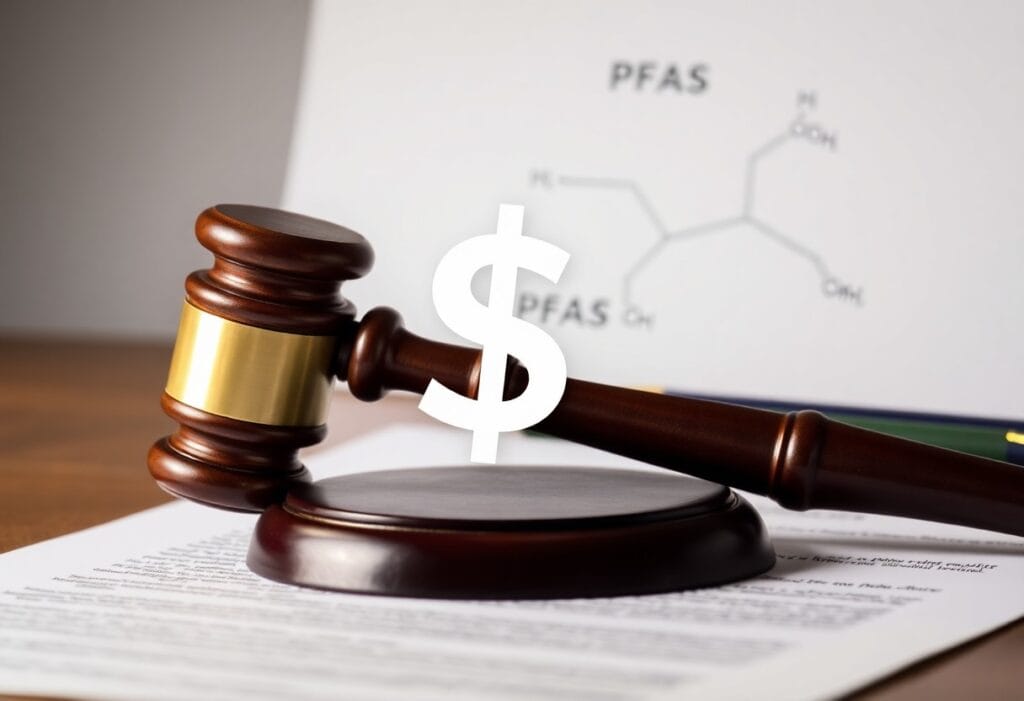With the rise in PFAS lawsuits, you may find yourself facing unexpected tax implications from your settlement or award payouts. Understanding how these payments are classified—whether as compensation for physical injuries or punitive damages—is important for your financial planning. Certain reimbursements may be non-taxable, while others could add to your taxable income. This blog post will guide you through the various aspects of taxation related to PFAS-related payouts, ensuring you are well-informed and prepared for your financial future.
Understanding PFAS and Their Legal Implications
For anyone affected by PFAS contamination, understanding the chemical’s implications is vital. These substances have been linked to various health issues, prompting increased regulatory scrutiny and legal action from victims seeking justice. As you navigate this complex landscape, it’s important to be aware of both the scientific and legal nuances involved in PFAS lawsuits.
Overview of PFAS
Against a backdrop of growing environmental concern, PFAS (per- and polyfluoroalkyl substances) are synthetic chemicals widely used due to their water- and grease-resistant properties. Found in various consumer products, they are persistent in the environment and your body, raising serious health alarm bells. Consequently, understanding these compounds is important as you consider your legal rights and potential recourse.
Legal Framework Surrounding PFAS Lawsuits
PFAS lawsuits are increasingly becoming a focus for both plaintiffs and legislators, as these substances have been linked to serious health issues. Understanding the legal landscape can help you grasp potential outcomes and your responsibilities as a claimant. The legal framework includes federal and state regulations, which govern clean-up efforts and liability claims related to PFAS exposure.
Plus, many states have enacted laws allowing individuals affected by PFAS to seek compensation for damages incurred from exposure to these harmful chemicals. These laws vary significantly, creating different opportunities and challenges for you as a claimant. Additionally, class-action lawsuits may provide a pathway for collective claims, potentially leading to more significant settlements. Familiarizing yourself with local statutes and recent legal precedents can serve your interests well in any potential litigation involving PFAS.
Tax Treatment of Lawsuit Settlements
Clearly, understanding the tax implications of lawsuit settlements, including PFAS lawsuit payouts, is vital for managing your finances effectively. Generally, these payouts can be categorized as compensatory or punitive damages, affecting how they are taxed. It’s important to clarify your settlement’s components to ensure proper tax reporting.
General Tax Principles for Settlements
The IRS generally treats lawsuit settlements as taxable income unless they are for personal physical injuries or sickness. In such cases, the compensation may be non-taxable. You must report your settlement on your tax return, so it’s vital to understand which parts of your settlement may be subject to tax.
Specific Considerations for PFAS Lawsuit Payouts
The tax implications of PFAS lawsuit payouts can vary significantly due to the nature of your claim. Payouts for economic losses or property damages are typically taxable, whereas amounts received for physical injuries might not be. Furthermore, if your settlement includes compensation for medical expenses or emotional distress related to PFAS exposure, you need to assess how those amounts fit into the broader tax framework.
But, because PFAS claims can involve complex damages, it’s vital to dissect your settlement carefully. Certain components, like reimbursement for medical expenses or punitive damages, may carry different tax treatments. Understanding that compensation related to emotional distress may be partially taxable can significantly impact your overall tax liability. Consulting a tax professional can be beneficial in determining how to best approach your specific situation and ensure compliance with IRS regulations.
Reporting Requirements for Affected Individuals
Some individuals affected by PFAS lawsuits may be unsure of their reporting obligations regarding settlement payouts. It is important to understand that the IRS requires you to report these payments as income on your tax return. The tax implications can vary depending on the nature of the settlement, and recognizing your obligations will help you avoid potential penalties.
IRS Guidelines on Reporting Settlement Income
At the heart of IRS guidelines is the principle that any amounts you receive from a settlement or lawsuit may be considered taxable income. This includes compensatory damages, punitive damages, and any interest accrued on your award. Be sure to categorize your income accurately to comply with federal tax laws.
Documentation Needed for Tax Purposes
Against this backdrop, maintaining accurate records is vital for substantiating your tax liabilities. You will need documentation related to the settlement, including the lawsuit’s settlement agreement, any court documents, and the financial records that detail how you have assessed your settlement proceeds.
Hence, it’s important to gather all relevant documentation to support your tax filings efficiently. This may include settlement agreements, court orders, and any correspondence with legal counsel. Ensure you keep these files organized and accessible since they can be instrumental during an IRS audit or inquiry. The amount you report, alongside the proper documentation, will help inform the IRS about the components of your settlement payout, including distinctions between compensatory and punitive damages.
Potential Deductions and Credits
Your financial situation may benefit from various deductions and credits when navigating the implications of PFAS lawsuit payouts. Whether related to medical expenses or environmental cleanup, understanding these potential tax advantages can help maximize your return or minimize your tax liability.
Medical and Related Expenses
By documenting any medical costs associated with PFAS exposure, you might be eligible to claim these expenses as tax deductions. This includes costs for treatments, medications, and even travel for medical care. Ensure you retain all receipts and records to substantiate your claims.
Tax Credits for Environmental Cleanup
One significant avenue for potential financial relief is the availability of tax credits aimed at environmental cleanup initiatives. These credits can be claimed by individuals or businesses who undertake necessary actions to remediate contaminated sites.
For instance, tax credits for environmental cleanup can offset the costs incurred while addressing PFAS contamination on your property. You might find that expenses related to soil remediation, water treatment, and other cleanup activities qualify for these credits. Moreover, states and local governments often provide additional incentives that could further relieve your financial burden, so exploring these options is advisable for any affected property owner.
Implications for Businesses Facing PFAS Liability
Despite the potential for significant financial losses, businesses facing PFAS liability can navigate tax implications effectively. Understanding how these lawsuits affect your financial standing is crucial for maintaining compliance and mitigating risks. With various strategies available, being proactive in addressing these liabilities can position your business more favorably in the long run.
Tax Consequences of Settlements
Consequences of PFAS lawsuit settlements may lead to unexpected tax burdens for your business. Settlements could be classified as taxable income, depending on the nature of the payout. It’s crucial to consult with tax professionals to properly evaluate the implications and plan accordingly to minimize your tax liability.
Impact on Corporate Tax Strategies
The financial ramifications of PFAS lawsuits may profoundly influence your corporate tax strategies. As you navigate these challenges, you may need to reassess your accounting methods and consider changes to your operational expenditures to accommodate potential liabilities.
For instance, if your settlements are treated as taxable income, you may find yourself reassessing your deductions and credits to optimize your overall tax situation. You might also consider adjusting your asset management strategies to mitigate potential liabilities in future fiscal planning. By engaging in proactive assessments and potential reallocation of resources, you can better prepare your business for the financial impact associated with PFAS lawsuits, thereby enhancing your overall financial resilience.

Future Trends in Tax Regulations on PFAS Lawsuits
Once again, the landscape of tax regulations surrounding PFAS lawsuit payouts is evolving. As public awareness of PFAS contamination increases, policymakers are likely to introduce new tax legislation aimed at better aligning these settlements with broader environmental accountability. This could mean potential changes in how you report gains from settlements, impacting both personal and corporate tax obligations. Staying informed will be necessary to navigate this shifting terrain effectively.
Anticipated Legislative Changes
After thorough discussions surrounding the environmental impacts of PFAS, lawmakers are expected to propose significant changes to the tax code. These changes may introduce legislation that specifically targets the taxation of PFAS-related lawsuit payouts, potentially affecting how settlements are treated under current tax laws. You should be prepared for these developments, as they could alter your financial landscape if you are involved in such legal actions.
Impact on Future Litigation and Settlements
Below, the anticipated changes in tax regulations are likely to influence how future litigation and settlements are approached. As new tax implications emerge, legal strategies may adapt to minimize tax burdens for plaintiffs. This could lead to innovative settlement structures, emphasizing tax-efficient payout mechanisms. Your understanding of these dynamics will be necessary if you’re considering litigation, as these changes could result in higher net outcomes from settlements should legislation favor the victim’s financial recovery.
The impact of evolving tax regulations on future PFAS litigation could reshape your approach significantly. As legislation aims to impose tax obligations on settlements, you might find yourself facing *higher financial repercussions*. However, savvy plaintiffs and their legal teams may develop strategies that leverage these changes, positioning you to maximize the benefits under the new tax framework. Understanding the potential for strategic settlement negotiations will be vital, as adapting to these trends could play a crucial role in securing a favorable outcome for you.
Final Words
Hence, understanding the tax implications of PFAS lawsuit payouts is vital for your financial planning. You may receive a settlement that could affect your tax liabilities, and it’s important to determine whether the compensation is taxable or not. Consulting a tax professional will help you navigate these complexities and ensure compliance, enabling you to make informed decisions that align with your financial goals. Being proactive in understanding these implications can safeguard your interests as you pursue justice and compensation for PFAS-related damages.


















